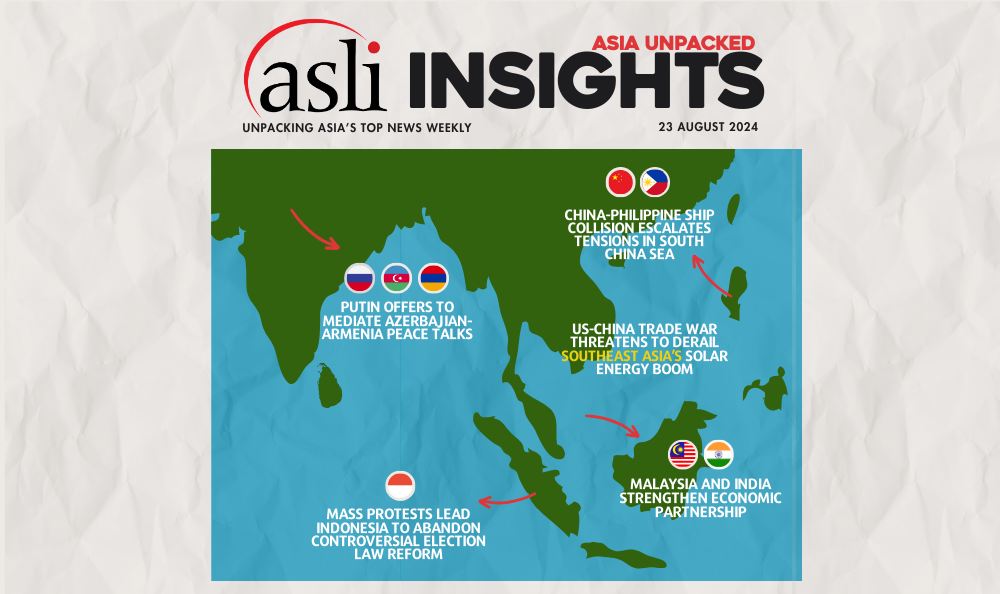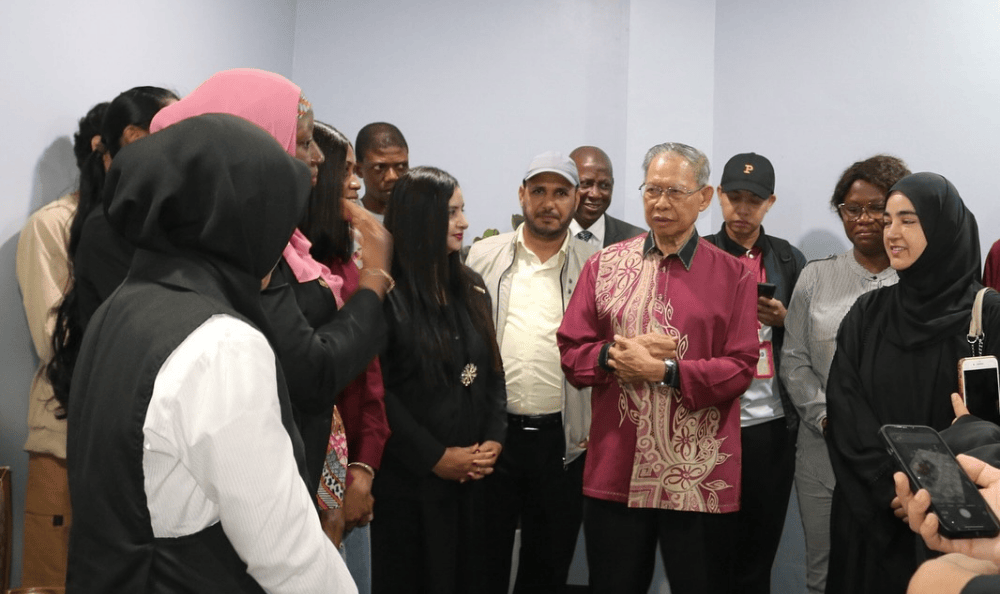
ASLI INSIGHTS: Asia Unpacked | 23 August 2024
ASLI is back with more ASLI INSIGHTS: Asia Unpacked!
Stay tuned for more top news in Asia handpicked by ASLI and for our curated weekly roundup!
This week’s Asia top news:
1) US-China Trade War Threatens to Derail Southeast Asia’s Solar Energy Boom
Southeast Asia's booming solar energy sector faces significant challenges due to escalating US-China trade tensions. The US is contemplating imposing substantial tariffs on solar imports from China and other Southeast Asian countries, including Malaysia. This move is part of the US's broader strategy to address concerns over unfair trade practices and intellectual property theft linked to China's solar industry. Malaysia, heavily invested in solar energy production and a key exporter to the US, is particularly vulnerable. If these tariffs are implemented, they could severely impact Malaysia’s solar sector, increasing costs and potentially disrupting regional solar supply chains. This situation highlights the broader impact of geopolitical disputes on global renewable energy markets.
Read more
- https://www.bloomberg.com/news/articles/2024-08-20/southeast-asia-s-solar-boom-threatened-by-us-china-trade-tension?embedded-checkout=true
- https://www.thestar.com.my/news/nation/2024/08/21/malaysia-caught-in-crosshairs-as-us-targets-hefty-solar-tariffs-on-china-south-east-asia-countries
2) Malaysia and India Strengthen Economic Partnership
Malaysia and India have strengthened their bilateral relationship through the exchange of eight Memorandums of Understanding (MOUs) focused on various sectors including trade, technology, and education. This development highlights both nations' commitment to deepening cooperation. Malaysia has also expressed readiness to meet India's growing demand for palm oil, a key aspect of their trade relations. The agreements and trade assurances aim to boost economic ties and foster closer collaboration between the two countries. These initiatives are expected to enhance strategic partnerships and contribute to mutual economic growth in the coming years.
Read more
- https://www.thestar.com.my/news/nation/2024/08/20/malaysia-india-solidify-ties-with-exchange-of-eight-mous
- https://www.freemalaysiatoday.com/category/business/2024/08/22/malaysia-ready-to-meet-indias-palm-oil-demand-says-tengku-zafrul/
3) Putin Offers to Mediate Azerbaijan-Armenia Peace Talks
During a recent visit to Baku, Russian President Vladimir Putin offered to mediate the peace process between Azerbaijan and Armenia. Putin expressed willingness to facilitate negotiations, aiming to resolve ongoing tensions between the two countries. His proposal underscores Russia’s continued role as a key intermediary in the conflict. Putin's offer comes amid strained relations and ongoing clashes in the region. By positioning Russia as a mediator, Putin seeks to bolster Russia’s influence and contribute to a potential peace deal. The move has been met with cautious optimism from both Azerbaijan and Armenia, highlighting Russia's strategic interest in stabilising the South Caucasus region.
Read more
4) China-Philippine Ship Collision Escalates Tensions in South China Sea
A recent maritime incident near Sabina Shoal in the South China Sea involved a collision between Chinese and Philippine vessels, exacerbating existing tensions. Both countries blamed each other for the incident. Sabina Shoal, a strategically sensitive area, has become a focal point in the broader maritime conflicts between China and the Philippines. The United States has expressed support for the Philippines, reinforcing its commitment to assist its ally amid escalating disputes. This incident highlights ongoing regional disputes and the complexities of international relations in the South China Sea, impacting both bilateral ties and broader geopolitical stability.
Read more
5) Mass Protests Lead Indonesia to Abandon Controversial Election Law Reform
Indonesia has abandoned its proposed changes to the election law following widespread protests. The planned reform aimed to alter the electoral process, but it faced intense opposition from pro-democracy activists and the public. Thousands took to the streets, rallying against what they perceived as an attempt to undermine the Constitutional Court's authority and manipulate the electoral system. The protests, which spanned across the country, played a key role in pressuring the government to shelve the reform. Supporters of the current system argue that the changes would compromise democratic processes and regional autonomy. The decision to halt the proposed law reflects the significant impact of public dissent on policy-making in Indonesia.
Read more
- https://www.channelnewsasia.com/asia/indonesia-lawmakers-election-law-shelved-protests-4561506
- https://www.aljazeera.com/gallery/2024/8/22/protests-across-indonesia-as-parliament-delays-change-to-election-law
🌱 Empowering Leaders, Advancing Societies.




